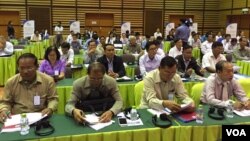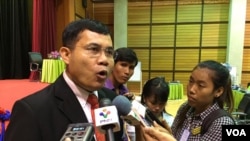Rights and development groups say a draft law on access to information will be more useful to the public if it has input from outside the government.
A number of civil society organizations met in Phnom Penh this week to discuss the law, in hopes of having the kind of input not seen in the drafting of other recent laws, including those regulating NGOs and unions.
Neb Sinthay, director of the Advocacy and Policy Institute, told reporters at the forum that the government has opened the process to participation more so than on past laws.
“I think that if this process keeps moving like that until the end of the drafting process, I can say that this law will serve the public mostly, meaning it will be different from other laws in Cambodia,” he said. “This could be the first time that the government offers special permission to have broad discussion in a participatory manner. If this mechanism keeps running like that until the end of the drafting process, this law will reflect more on public interest than other laws.”
The drafting process began at the Ministry of Information in 2013. Uk Kimseng, undersecretary of state at the Ministry of Information, told participants at the forum that the ministry has held regular meetings with national and international organizations since then to help the technical working group draft the law.
The scope of the law affects all sectors, requiring all public institutions to provide the maximum amount of information to the public, he said. The drafting of the law is expected to take three years, he said.
International law calls for access to information as a basic right, including under UN conventions. And Cambodia’s draft law is coming at a time when media in Cambodia is growing. But it has been traditionally difficult to get official information through official channels from government institutions—especially for journalists.
Experts say the draft law must allow for complaints against government agencies that deny access to information, as well as a reduction in red tape to get the information.
So Sorthy, communications and advocacy officer of the Cambodian Center for Independent Media, said a survey of 83 reporters recently found that 90 percent of them cited a lack of access to information as a main impediment to their work. That has an impact on the public, which needs credible information for their daily lives, he said.
“So the lack of a right to information for reporters is the lack of the right to information for the general public as a whole,” he said.









